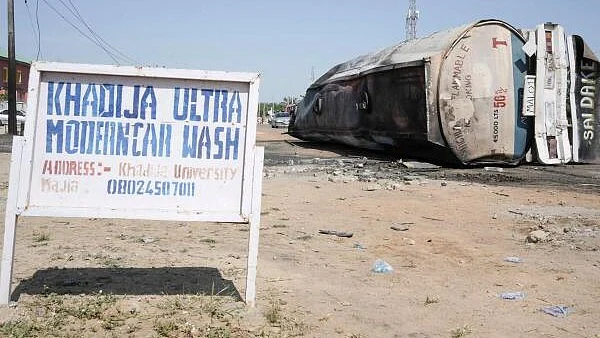
A fuel tanker that overturned after the driver lost control of the vehicle and caused fatalities, according to police and state emergency services, is seen in the middle of a road, in Majia.
Credit: Reuters Photo
Majia: The driver of a fuel tanker was transporting 45,000 liters of gasoline on an unlit road in northern Nigeria on Tuesday night when a van carrying tomatoes veered into his lane. The driver lost control of his vehicle as he tried to avoid the van.
The tanker capsized.
The driver, Yusuf Mohammad, emerged from the truck uninjured, as did the driver of the van. But within minutes, hundreds of residents swarmed around the overturned tanker to scoop up the spilled gasoline, an increasingly expensive and scarce commodity in Nigeria.
The decision cost them their lives. The tanker exploded an hour later and killed 168 people in the state of Jigawa, according to emergency officials. It was one of the deadliest road accidents ever recorded in Nigeria. Over 90 others remained hospitalized as of Thursday evening.
On Thursday, mourners circled around the area where most of the victims had been buried in the town of Majia, 70 miles away from Nigeria's second-largest city, Kano.
The burned tanker, covered in soot, still lay on its side, just yards away from the burial and charred crops of sorghum.
President Bola Ahmed Tinubu has promised stricter nighttime driving protocols and a review of safety measures for fuel transportation in the wake of the explosion. But the incident this week highlighted how chronic poverty and rising prices in Africa's largest oil-producing country contributed to the disaster.
Fuel prices have more than tripled over the last year in Nigeria as Tinubu's administration has moved to abandon a costly government fuel subsidy that for decades gave Nigerians access to some of the cheapest gasoline in Africa.
Further compounding Nigerians' hardships, food and electricity prices have skyrocketed as the naira, the national currency, has lost 70% of its value. In the north, devastating floods in recent weeks have destroyed the equivalent of six months of food for 8.5 million people, according to the United Nations' Food and Agriculture Organization.
After Mohammad's tanker overturned around 11:30 p.m. Tuesday, residents ignored pleas to stay away from the truck, he and three other witnesses told The New York Times in interviews in Majia.
"Some even insulted me, assuming that I was trying to stop them from collecting petrol that could be sold for money," said Gambo Majiya, a local resident. "They argued that since the petrol didn't belong to me, I had no right to discourage them."
The first road safety officials, firefighters and police officers reached the scene about 30 minutes after the spill, but they were outnumbered and people kept scooping out the fuel, the witnesses said.
Among the crowds who rushed to the overturned tanker, and unbeknown to Majiya, were four of his own sons. Muhammad and Mubarak died in the explosion, Majiya said. They were 21 and 20. Two of his younger sons, Shamsu and Yakubu, aged 18 and 15, were still hospitalized as of Thursday.
Moments before the tank exploded, some cars passed by and stopped to buy the fuel that residents had scooped up, said Isa Sandaye, a resident of Majia.
Most of those killed were men who burned to death close to the tanker. Others got caught in the fire as they tried to assist victims, Sandaye and other witnesses told the Times. Sandaye said he transported dozens of victims to nearby hospitals.
Bystanders were also killed as people tried to escape the inferno. Sani Idris, 12, died after he was hit by a car that was driving away from the fire, his father, Mai Katako, said.
Fuel tanker explosions have become common in Nigeria. Last month, at least 59 people died when a passenger truck and two other vehicles hit a toppled-over fuel tanker that had caught fire.
The World Health Organization estimated that more than 36,000 people died in road accidents in Nigeria in 2021, the most recent year for which data is available. That is six times higher than the Nigerian government's estimates, which report between 5,000 and 6,000 road-related deaths every year.
Farmers mostly populate Majia, and on Thursday many of them stopped by fields along the roads to console one another. Elsewhere across town, families received mourners and relatives who were offering condolences.
"Traffic accidents disproportionately affect low-income earners," said Simon Obi, executive director of Greenlight Initiative, a Nigerian and Ghanaian nonprofit that promotes stronger transportation safety measures.
While fuel tanker explosions are not the most common traffic incidents, Obi said, they are usually much deadlier.
Children as young as 10 were killed in Majia on Wednesday, Sandaye said.
"People were running toward us," he said. "But we had to run away as their bodies were on fire."